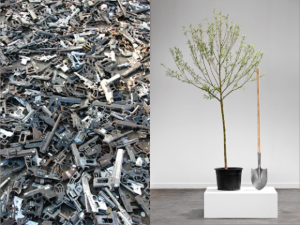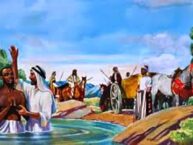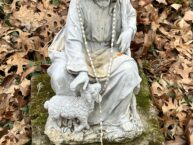 December 1, 2019: May God’s words alone be spoken, may God’s words alone be heard. Amen.
December 1, 2019: May God’s words alone be spoken, may God’s words alone be heard. Amen.
There are times while reading the gospel passage for the day when I want to pause and say, in my best Indigo Montoya voice “You just heard those words. I do not think it means what you think it means.” Okay, probably not a good idea – the voice, or pausing – take your pick. But today is one of those times when it is important to address some misconceptions about what is going on in the gospel.
Now we all know we begin Advent with these eschatological, or end times, passages starting just after All Saints. However, the passage we heard today has been used, errantly, to refer to some sort of rapture in those end times, where the good people get sucked up in some sort of cataclysmic divine version of a Marie Kondo Netflix show. This is NOT what Jesus was saying.
This idea of a rapture is a fairly new concept driven out of poor biblical scholarship based on literal interpretation. As the Rev. Canon Frank Logue, (soon to be bishop of Georgia), put it: “In 1830, fifteen year old Margaret MacDonald had a vision during a healing service in where she saw a two-stage return of Jesus. Her vision was adopted by Plymouth Brethren founder John Nelson Darby who looked around scripture cobbling together verses from Revelation, Daniel, Thessalonians and Gospel passages like our text from Matthew. Darby’s system is the basis for all teaching on The Rapture, a concept that did not exist in any Christian church 200 years ago.” In other words – the rapture is an 19thcentury literalist creation. Jesus is not talking about that.
Now that we have that cleared up, I want to talk a bit about two of the other passages from this morning – the one from Isaiah, and the one from the epistle of St. Paul to the Romans. These two have a lot to tell us in these days when, as we say at the beginning of our Advent services “…the nights grow longer and the days grow shorter…” One proclaims what is possible even amidst the darkness of the world, the other tells us how to live into it – how to make it real.
First let’s look at Isaiah. We hear a lot of this book in Advent. For the next several weeks we will hear passages so very familiar to us, so appropriated into a Christian context particularly in this time of year, that we have lost some of the powerful message found in its Jewish roots. Isaiah is a long book that scholars break into three sections, based on time of composition and authorship. This passage is from the first part of Isaiah written sometime in the 8th century BCE, which is believed by scholars to have been, unlike the other two, primarily authored by the prophet himself.
Now, to be clear, Isaiah was not the kind of prophet we hear about in the next two weeks – that wild and crazy guy, John the Baptizer. No, Isaiah, a contemporary of Hosea and Micah, was likely a man of means with access to those in power. He was called rather reluctantly, if we listen to his story in Isaiah 6, into the life of a prophet. Yet, as we know from the stories of Moses, Jonah, well, really all of them, prophets are usually dragged into this work, or at the very least, feel unworthy of it.
Despite his initial reservations, he did become God’s voice – saying “Here am I. Send me.” All of which happens in later verses than what we are hearing today. The passage today is the beginning of how he came to know the vision of God for this world, and what it was he was to tell the people, that it might be brought into reality.
As I said, the passages we will hear from this book in the weeks to come, like the one today, contain verses that are so familiar, we run the risk of not really listening to them. In fact, some of the words we heard today have become larger than life – inscribed on the wall of a garden across from the United Nations, and depicted in a bronze statue in the North garden of the UN, created by a Soviet artist, Yevgeny Vuchetich, in 1959. These are those very words: “they shall beat their swords into ploughshares, and their spears into pruning-hooks; nation shall not lift up sword against nation, neither shall they learn war any more.”
These recognizable verses are said not only by this prophet, but by his contemporary Micah, which locked them into a long legal copyright battle still not resolved to this day – kidding, of course.
But let’s get back to Isaiah.
Here’s the thing… to really understand this prophet, and what he is saying to the people then and now, we have to start at the opening of this passage and not skip past it on our quest to get to the familiar. He begins with, “The word that Isaiah son of Amoz saw concerning Judah and Jerusalem…” Listen to that again “The word that Isaiah son of Amoz saw…” Isaiah didn’t write the “the words that Isaiah, son of Amoz, heard,” but the word that he saw!
What does it mean to see the word? It isn’t normal seeing, to be sure. The Hebrew word used here isn’t the one for regular eyesight, but for spiritual vision. Now, think about that again – what does it mean to see the word? To see it spiritually, beyond the physical plane? That is prophetic vision, and it is the stuff of dreams, the way prophets of all generations have been capable of seeing – going beyond the now, to what may be.
George Bernard Shaw, the author and playwright, understood it when he wrote “You see things; and you say Why? But I dream things that never were; and I say Why not?” The Rev. Dr. Martin Luther King, Jr. understood it when he proclaimed “I have a dream that my four little children will one day live in a nation where they will not be judged by the color of their skin but by the content of their character.” And Helen Keller understood it when she said “The only thing worse than being blind is having sight and no vision.”
But what does this mean for us? Everything. For Isaiah, it was to see the dream of God of justice and peace for all of God’s creation. For us it is to see Jesus – really see him in our neighbor, and in ourselves. Isaiah saw this word, and we know that it called him forward as a prophetic voice for righteousness, an agent of change for God’s vision of shalom. What does it mean for us who as we await the birth of Jesus? Everything. Everything, because Jesus was the Word made flesh.
The thing is, Advent may be a time of anticipation and preparing, but it isn’t for some meek and mild story about a donkey, a young couple, a few shepherds, and the birth of a child. It is for the radical overturning of the world through the bursting forth of the living word into our lives – the word made flesh and dwelling among us. God incarnate!
This is why we have these iconoclastic warnings in this season telling us to keep watch, or stay awake. Because this birth we await happens within us, around us, and through us, and it will change everything if we let it. Advent is a wake up call!
This is why Advent begins in destruction, because to create something new, to give birth to the possible, some part of the old is destroyed. It is a transformative experience – it changes everything!
And if we are to be the people of God we are called to be, part of the Jesus movement, then we must see the word – Jesus. And we must, as the epistle St. Paul wrote, and as we prayed at the opening of our service, “put on the armor of light…laying aside the works of darkness…we must put on the Lord Jesus Christ.” What does this mean?
To put on the armor of light is to accept the call of our baptism – when we were baptized into his death and life. It is to discard our ordinary lives to be the extraordinary body of Christ in the world that others might see the word and be transformed by it. It is to not only hear the word in church, but receive it in the Eucharist, and to be it in our lives. It is to open ourselves up to being molded into the people God hopes for us.
Think of a work of art – it is transformative, or can be, if we let it. Yet it begins as something else, right? When a sculptor sees in a block of stone something beyond what we see, and then she chips away at the stone, what is left is the work of art – the dream she had for it. What is discarded is that which stood in the way of it coming into being. God sees in us and the world something beautiful, often beyond what we can imagine, and if we are open to the transformation, we can become what God hopes for us – Her hands at work in the world, co-creators changing what is, to what may be.
I am reminded of a story from 2014 about a creative activist named Pedro Reyes in Culiacán, Mexico. Culiacán a city with the highest rate of gun deaths in the nation. In response to the violence, he worked with the city to advertise a gun buy-back program where the weapons could be turned in for coupons that could be used for purchases of household items. 1,527 guns were turned in – 40% of those were assault rifles. The guns were then melted down and turned into a shovel head, each handle attached bearing an inscription telling the story. The project didn’t stop at the sword into plowshare point. Reyes then used the shovels to plant 1,527 trees in the city as part of the Art through Embassies program.[1] What once had caused death, now brought forward life!
This is the transformative power of God at work in the world. This is justice and peace arising from the ashes of hate and war – the very vision Isaiah saw, the dream of God. This is also what it means to follow Jesus, whose birth we await anew this Advent. We are transformed in baptism to see the word made flesh, and be the word in the world – to put on the armor of Christ’s light – that we too can be the agents of transformation for all of God’s creation. And the time for us to do this is now!
The lesson from the epistle today begins in this way, “You know what time it is, how it is now the moment for you to wake from sleep.” There is nothing wrong with sleep – thanks be to God – but we hear this theme a lot in Advent, don’t we. Why is that? Why does Jesus think it is that important? Why do the prophets and apostles tell us this too?
Because dreams become reality only if we wake up. And God is imploring us to wake up to who we are, and what we are called to do. Now is not the time to be asleep at the wheel.
Earlier I quoted from the Rev. Dr. Martin Luther King, Jr. Like Isaiah, he saw God’s word, but despite the dangers that would later take his life, he didn’t just say it was a nice dream, roll over, and play it safe. He also didn’t think that those of us who heard his words would return home and do nothing with them either. He expected that we would respond and act to make the dream he had a reality for a world in need.
This is how God works in the world – we are called, we are sent, and we bring about a bit of God’s dream in each act, each prophetic witness, one day, one powerful voice, one act of love at a time.
Isaiah was called to see the dream of God, and then to act to turn it into reality.
Jesus calls us too – to see him, to experience him in the Eucharist, and then to put on his armor of light and be him in the world, that we might lift up those in darkness, those others do not, or will not see, and fill them with the food of his love and grace.
If we do this – if we can open our eyes to see the dream of God, if we can open our hearts to see the word made flesh – then there is nothing that is not possible.
We can, and we will, tear down the walls that divide us.
We can, and we will, overturn the institutions that oppress others.
We can, and we will, destroy through the power of Christ’s love weapons of death and turn them into tools for new life.
You know what time it is…
“You know what time it is, how it is now the moment for you to wake from sleep.”
Let us be up and on the move – putting on the armor of Christ’s light and transforming the world.
Amen.
[1] https://art.state.gov/palas-por-pistolas/
For the audio from the 10:30am service, click below, or subscribe to our iTunes Sermon Podcast by clicking here:
The Rev. Diana L. Wilcox
Christ Church in Bloomfield & Glen Ridge
December 1, 2019
Advent 4 – Year A
1st Reading – Isaiah 2:1-5
Psalm 122
2nd Reading – Romans 13:11-14
Gospel – Matthew 24:36-44






